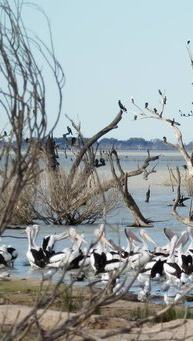Menindee review calls for talks
 WaterNSW has released its Menindee flood operations review.
WaterNSW has released its Menindee flood operations review.
WaterNSW says there are lessons to learn in the findings of an internal review of its operations during the Menindee flooding events from May 2022 through to February 2023.
The independently reviewed report found improvements could be made in data collection upstream of the lakes, and in communications with the local community and other response agencies.
Feedback from the residents in the Menindee area contributed to the report’s final recommendations, including:
-
The development with community, of a coordinated communication and engagement plan for future events,
-
A review of the river gauging network, to help inform decision making, and
-
Improvements to the WaterNSW Computer Aided River Management decision support system technology.
WaterNSW will host an information session on the report for the Menindee community in coming weeks and thanks those who took time to contribute to the review process.
WaterNSW says it acknowledges the floods’ devastating impact on the Menindee community, particularly those who rely heavily on the river and First Nations communities, given their deep connection to the river and country.
The report found that WaterNSW’s systems, policies and procedures were appropriate, and that it had developed, and used during the Darling River flood events, appropriate systems, policies and procedures to work within its regulatory environment and fulfil its responsibilities regarding system operations, dam safety, asset management and incident management responsibilities.
It also found that WaterNSW managed the Lakes throughout these events to the best of its ability within the operating rules and asset limitations of the system – reducing the magnitude of the peak instantaneous flood discharge by 29.2 per cent.
However, it also outlined opportunities to improve communications and engagement with the local community
While multiple agencies made efforts to provide timely and important information, there remains confusion about roles and responsibilities in this complex environment, which contributes to poor understanding of where relevant information can be found during floods.
Many locals expressed the opportunity to be listened to by agencies in a more coordinated manner, with a desire to have their local knowledge, experience and connections to the river system incorporated into water system operations.








 Print
Print